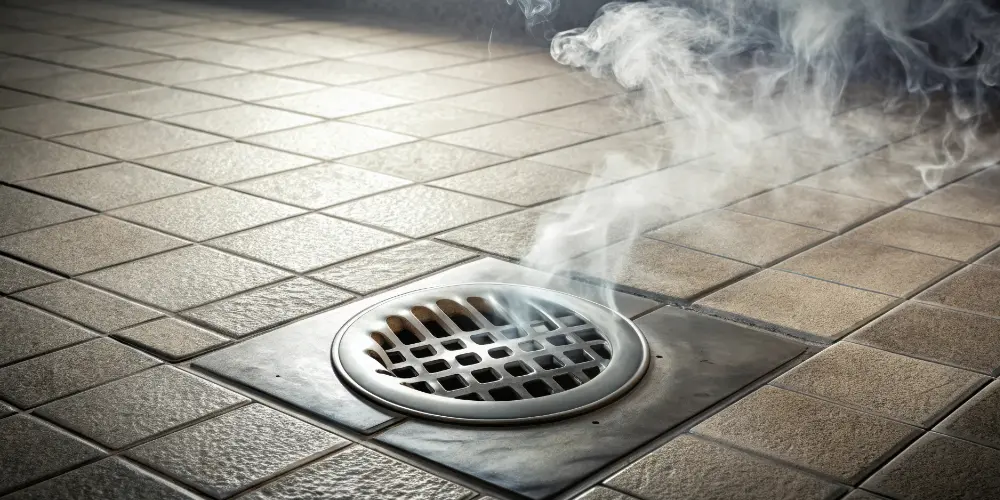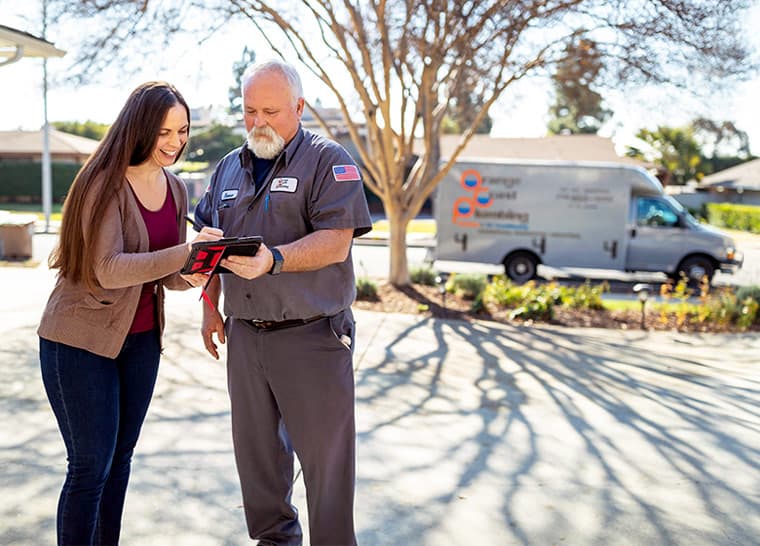Have you ever caught a strange, unpleasant smell in your home that you can’t identify?
We’re not talking about the botched tuna casserole in the oven or the spoiled refried beans in the garbage.
This smell is more like rotten eggs with a metallic trace. As pungent as it is in the kitchen, it’s much worse in the bathroom and other humid spaces.
You could be dealing with sewer gas.
What Is Sewer Gas?
Sewer gas is a complex mixture of gases produced by decomposing organic refuse in sewer systems, septic tanks, or other waste-handling infrastructure.
It originates from the anaerobic breakdown of biological materials in human waste, food remnants, and other organic matter.
Components of Sewer Gas
Sewer gas typically includes:
- Hydrogen sulfide (H₂S) – A toxic, flammable gas with a characteristic “rotten egg” odor.
- Methane (CH₄) – Odorless and highly flammable; harmless in small amounts but explosive in concentration.
- Carbon dioxide (CO₂) – Non-flammable, but displaces oxygen in enclosed spaces.
- Ammonia (NH₃) – Pungent and irritating to the eyes and respiratory system.
- Volatile Organic Compounds (VOCs) – A variety of organic molecules, some with strong or unpleasant odors, potentially carcinogenic.
- Nitrogen and nitrogen-based compounds – From the breakdown of proteins and urea.
Where Sewer Gas Comes from
Sewer gas is typically present in:
- Municipal sewage systems and treatment plants
- Septic tanks
- Drainage systems in homes, especially if P-traps dry out or vents are blocked
- Floor drains, toilets, sinks, or shower stalls that are rarely used
Why Sewer Gas Smells So Strong
The human nose is extremely sensitive to hydrogen sulfide — even in minute amounts (as little as 0.0005 ppm). The rotten egg smell of sewer gas is often the first warning sign of a leak and should be taken seriously.
What Causes Sewer Gas?
There are multiple ways sewer gas can enter your home:
1. Dry Plumbing Traps
These U-shaped pipes beneath sinks, showers, and toilets hold water that creates a barrier against sewer gas. If these traps dry out, the barrier ceases to exist.
2. Cracked Sewer Pipes
A crack or break in your home’s sewer pipes allows gas to escape into your living spaces. This could be due to age, shifting foundations, or poor installation.
3. Blocked Ventilation Pipes
Plumbing systems have vent pipes that carry sewer gas safely out of your home. If leaves or debris block these pipes, the gas has nowhere to escape.
4. Poorly Sealed Fixtures
Damaged seals around toilets or drains can let gas seep out, especially during pressure changes in the plumbing system.
5. Clogged Drains
Build-up from hair, grease, or debris can clog drains, trapping sewage odors and gases.
Is Sewer Gas Dangerous?
Yes, sewer gas can pose health risks depending on its concentration and the duration of exposure.
Short-Term Effects
- Mild Exposure: Can cause headaches, nausea, dizziness, or irritation of the eyes, nose, and throat.
- Moderate Exposure: Prolonged exposure to gases like hydrogen sulfide can result in symptoms like difficulty breathing.
Long-Term Risks
- Hydrogen Sulfide Poisoning: While rare, prolonged exposure to high levels of hydrogen sulfide can be life-threatening.
- Methane Accumulation: Methane is flammable and can be an explosive hazard if it accumulates in an enclosed space.
The risk of serious harm from sewer gas is low in most cases; however, odors should never be ignored.
Getting Rid of Sewer Gas
1. Refill Dry Traps
Pour water down unused sinks, showers, or floor drains to fill their traps. Adding a small amount of mineral oil can prevent water from evaporating too quickly.
2. Inspect and Repair Seals
Check for cracks or gaps around plumbing fixtures, such as toilets and drains. Replace wax rings or have professionals reseal fixtures as needed.
3. Clear Ventilation Pipes
Head to your roof and inspect plumbing vents for blockages. Remove any debris and consider professional help if the vent is inaccessible.
4. Unclog Drains
Use a drain snake, plunger, or eco-friendly drain cleaner to clear any obstructions. Avoid harsh chemical cleaners, which can damage pipes.
5. Fix Broken Sewer Pipes
Call a licensed plumber immediately if you suspect a cracked or damaged pipe. Repairs to sewer pipes require expert attention.
6. Check for Larger Issues
Foul smells persisting even after these steps could indicate more significant problems, like a faulty septic tank. Schedule an inspection to rule out serious concerns.
Preventing Future Problems
These preventative can reduce the risk of sewer gas in your home:
- Run water through infrequently used drains every few weeks to keep the traps from drying.
- Schedule an annual inspection to catch potential issues before they become significant problems.
- Invest in quality seals for your plumbing fixtures to minimize leaks.
- Regularly clear drains of debris to prevent clogs.
- Check plumbing vents and roof pipes after storms or heavy winds.
FAQs: Sewer Gas
Q: What does sewer gas smell like?
Sewer gas typically smells like rotten eggs due to hydrogen sulfide.
Q: Can sewer gas make me sick?
Yes, especially at high concentrations. Mild exposure may cause headaches and nausea, while prolonged exposure can be more serious.
Q: What should I do if I smell sewer gas?
Identify the source and take steps to resolve the issue. Start by refilling dry traps and checking seals around plumbing fixtures. Call a plumber if necessary.
Q: Is sewer gas flammable?
Methane, a major component of sewer gas, is highly flammable and can pose an explosion risk in confined spaces.
Q: Can I prevent sewer gas smells?
Use drains regularly, seal plumbing fixtures correctly, and schedule routine inspections to prevent problems.
Q: Do clogged drains cause sewer gas?
Clogs can trap odors and gas, causing unpleasant smells to linger.
Q: How do I block sewer gas from entering my home?
Ensure water traps remain wet, seals are intact, and vent pipes are clear of blockages.
Q: Should I call a professional?
If DIY methods don’t resolve the issue or you suspect structural plumbing damage, consulting a plumber is your safest bet.


